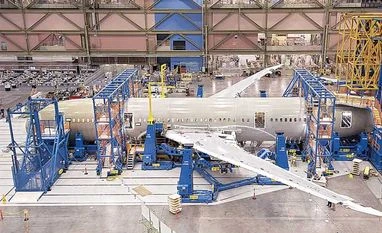Aequs, which operates from a special economic zone (SEZ) in Belgaum (officially Belagavi), will be a modest cog in Boeing's global supply chain. It will machine small components that will then be transported to Holland. There, Fokker Technologies will build these into sub-assemblies that feed into the Chinook assembly line outside Philadelphia, in the US.
The value of this initial contract is tiny - below $5 million, say Boeing sources. Yet, companies like Aequs are pioneers among India's emerging aerospace suppliers. Larger public firms, like Hindustan Aeronautics Ltd (HAL) and its ancillary suppliers, remain inwardly focused, assembling combat aircraft bought by the Indian Air Force. These companies have barely dipped their toes in the pool of international defence manufacture.
More From This Section
In contrast, Aequs, and others like it, are focusing on manufacturing components for the global supply chains of aerospace vendors, an $80-100 million annual market with India's share less than $400 million. Established in 2007 (as Quest Global Manufacturing), Aequs initially relied on an assured income stream from civil aerospace, which is insulated from the turbulence of the defence market. Even today, Aequs' Belgaum SEZ sends out a flow of machined components to commercial manufacturers like Boeing, Airbus, and smaller vendors like ATR, Pilatus and Gulfstream.
However, military aerospace vendors are now seeking civil aerospace firms like Aequs for discharging offset liabilities. Boeing alone has sold about $10 billion worth of military aircraft to India; its offset liability of 30 per cent amounts to over $3 billion.
Indian companies have begun benefiting from this. Dynamatic Technologies is already supplying ramps and pylons to Boeing for the Chinook, and power and mission equipment cabinets for the P8-I multi-mission maritime aircraft (MMA). Tata Advanced Materials (TAML) has contracted to supply P8-I components to Boeing. Another group company, Tata Manufacturing Solutions (TAL) has begun supplying ground support equipment for the C-17 Globemaster III aircraft. Rossel Techsys manufactures wire bundles for Boeing's military aircraft. Punj Lloyd has established a high-tech manufacturing facility near Gwalior to tap into this market. "We initially order small, relatively simple components, while ensuring a back-up supplier. If the company delivers on-time and on-quality, we can move on to bigger and more complex orders," says a executive.
A handful of Indian companies have moved beyond manufacture into the prestigious (and often more profitable) realm of aerospace design. Hyderabad-based Cyient (formerly Infotech Enterprises) works with aerospace multinationals on critical design-engineering products, including aero engines. Chennai-based Data Patterns, has designed cutting-edge aerospace products. These companies, and others like them, allow global vendors to reap offset benefits with sourcing R&D from India. The government provides offset "multipliers" of up to three for R&D. That means for Rs 100 crore worth of R&D sourced from India, the vendor obtains offset credit worth Rs 300 crore.
India's defence public sector monoliths, HAL and Bharat Electronics (BEL), also manufacture F/A-18 fighter and P8-I components. However, these are side shows for these companies, with the central focus remaining on designing, developing and assembling major weapons platforms.
Compared to this, Aequs provides prospective foreign customers with a model of agility and entrepreneurial ability. The non-resident Indian owner, Aravind Melligeri, bought 250 acres in Belgaum and set up his own manufacturing SEZ.
Melligeri imports his raw materials, machine tools, cutting tools and oils to feed the high-end machining capacities he has established. His SEZ has built-in redundancy for power, water and essential facilities. His tenants include Saab Aerospace, Magellan Aerospace, and French forgings companies, Aubert and Duval.
"The machining business is big in this region. There are 150 casting foundries around Belgaum, which has historically supplied the automotive manufacturers around Pune", said Melligeri to Business Standard during a visit to Aequs. "I provide skilled labour, and my business model rests on its lower cost. The key differentiator is volume. We are doing 750,000 hours per year and soon hope to reach a million hours annually. Of this, aerospace machining accounts for 500,000 hours," says Melligeri.
Because of the need to be self-contained for most services and materials, Aequs' business risk stems from the cost of capital.
"I have to ensure on-time delivery, so we run two-month inventories for most materials. This requires working capital, which is a negative in a country where capital costs are so high", he says.
)